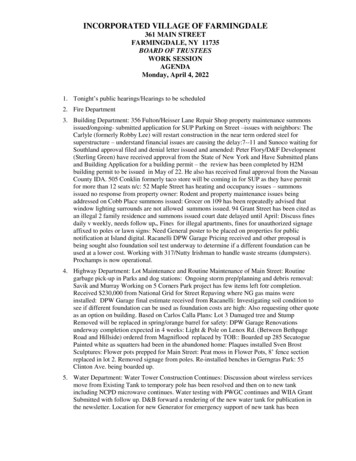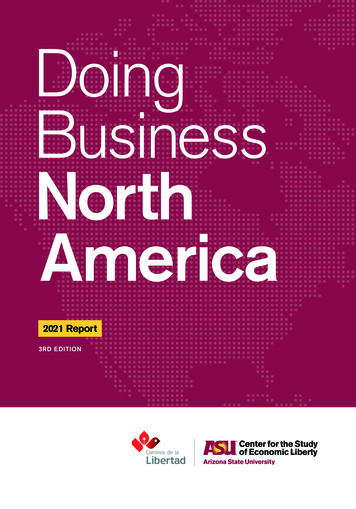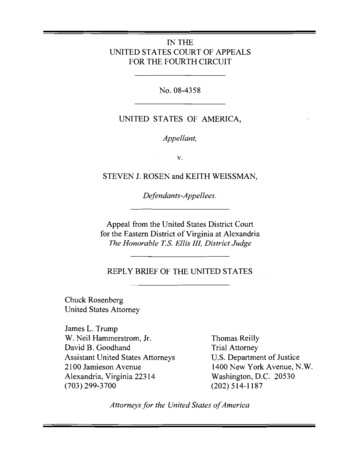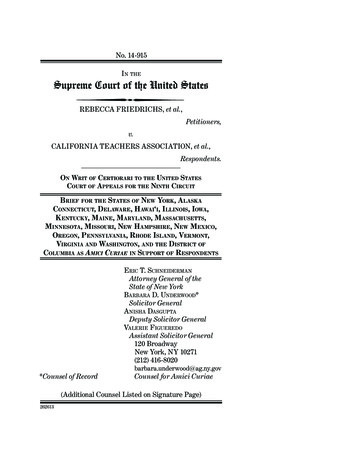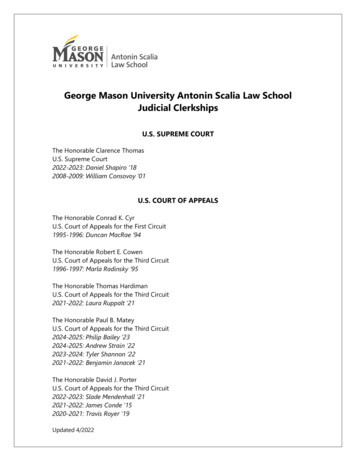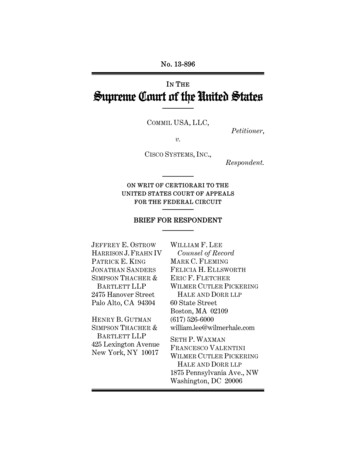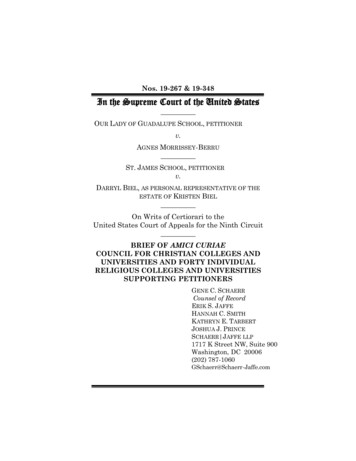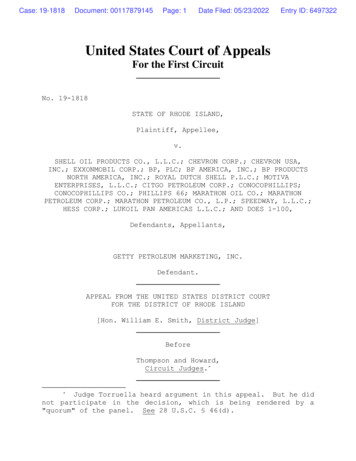
Transcription
Case: 19-1818Document: 00117879145Page: 1Date Filed: 05/23/2022Entry ID: 6497322United States Court of AppealsFor the First CircuitNo. 19-1818STATE OF RHODE ISLAND,Plaintiff, Appellee,v.SHELL OIL PRODUCTS CO., L.L.C.; CHEVRON CORP.; CHEVRON USA,INC.; EXXONMOBIL CORP.; BP, PLC; BP AMERICA, INC.; BP PRODUCTSNORTH AMERICA, INC.; ROYAL DUTCH SHELL P.L.C.; MOTIVAENTERPRISES, L.L.C.; CITGO PETROLEUM CORP.; CONOCOPHILLIPS;CONOCOPHILLIPS CO.; PHILLIPS 66; MARATHON OIL CO.; MARATHONPETROLEUM CORP.; MARATHON PETROLEUM CO., L.P.; SPEEDWAY, L.L.C.;HESS CORP.; LUKOIL PAN AMERICAS L.L.C.; AND DOES 1-100,Defendants, Appellants,GETTY PETROLEUM MARKETING, INC.Defendant.APPEAL FROM THE UNITED STATES DISTRICT COURTFOR THE DISTRICT OF RHODE ISLAND[Hon. William E. Smith, District Judge]BeforeThompson and Howard,Circuit Judges.*Judge Torruella heard argument in this appeal. But he didnot participate in the decision, which is being rendered by a"quorum" of the panel. See 28 U.S.C. § 46(d).*
Case: 19-1818Document: 00117879145Page: 2Date Filed: 05/23/2022Entry ID: 6497322Theodore J. Boutrous, Jr., Thomas G. Hungar, Anne Champion,Gibson, Dunn & Crutcher LLP, Gerald J. Petros, Robin L. Main, RyanM. Gainor, Hinckley, Allen & Snyder LLP, Neal S. Manne, SusmanGodfrey LLP, John A. Tarantino, Patricia K. Rocha, Nicole J.Benjamin, Adler Pollock & Sheehan P.C., Nancy G. Milburn, MatthewT. Heartney, Jonathan W. Hughes, Arnold & Porter Kaye Scholer LLP,Matthew T. Oliverio, Oliverio & Marcaccio LLP, Theodore V. Wells,Jr., Daniel J. Toal, Jaren Janghorbani, Kannon Shanmugam, Paul,Weiss, Rifkind, Wharton, Garrison LLP, Jeffrey S. Brenner, NixonPeabody LLP, David C. Frederick, Grace W. Knofczynski, Kellogg,Hansen, Todd, Figel & Frederick, P.L.L.C., Daniel B. Levin, JohnE. Bulman, Stephen J. MacGillivray, Pierce Atwood LLP, Nathan P.Eimer, Pamela R. Hanebutt, Lisa S. Meyer, Raphael Janove, Ryan J.Walsh, Eimer Stahl LLP, Michael J. Colucci, Olenn & Penza, LLP,Sean C. Grimsley, Jameson R. Jones, Daniel R. Brody, Bartlit BeckLLP, Robert G. Flanders, Jr., Timothy K. Baldwin, Whelan, Corrente& Flanders, LLP, Steven M. Bauer, Margaret A. Tough, Latham &Watkins LLP, Shannon S. Broome, Shawn Patrick Regan, Ann MarieMortimer, Hunton Andrews Kurth LLP, Jeffrey B. Pine, Patrick C.Lynch, Lynch & Pine, Jason C. Preciphs, Roberts, Carroll, Feldstein& Peirce, Inc., J. Scott Janoe, Megan Berge, Baker Botts L.L.P.,Lauren Motola-Davis, Samuel A. Kennedy-Smith, Lewis BrisboisBisgaard & Smith LLP, Tracie J. Renfroe, Oliver Peter Thoma, King& Spaulding LLP, Stephen M. Prignano, McIntyre Tate LLP, JamesStengel, Robert Reznick, and Orrick, Herrington & Sutcliffe, LLP,on supplemental brief for appellants.Victor M. Sher, Matthew K. Edling, Sher Edling LLP, and NeilF.X. Kelly, Assistant Attorney General, Office of the AttorneyGeneral, on supplemental brief for appellee.Andrew R. Varcoe, Stephanie A. Maloney, U.S. ChamberLitigation Center, William M. Jay, Andrew Kim, and Goodwin ProcterLLP, on supplemental brief for The Chamber of Commerce of TheUnited States of America, amicus nufacturers' Center for Legal Action, Philip S. Goldberg,Christopher E. Appel, and Shook Hardy & Bacon L.L.P., onsupplemental brief for The National Association of Manufacturers,Energy Marketers of America, and The National Association ofConvenience Stores, amici curiae.Steve Marshall, Attorney General of Alabama, Treg Taylor,Attorney General of Alaska, Leslie Rutledge, Attorney General ofArkansas, Christopher Charr, Attorney General of Georgia, TheodoreE. Rokita, Attorney General of Indiana, Thomas M. Fisher, SolicitorGeneral, Kian J. Hudson, Deputy Solicitor General, Julia C. Payne,Deputy Attorney General, Derek Schmidt, Attorney General ofKansas, Daniel Cameron, Attorney General of Kentucky, Jeff Landry,
Case: 19-1818Document: 00117879145Page: 3Date Filed: 05/23/2022Entry ID: 6497322Attorney General of Louisiana, Lynn Fitch, Attorney General ofMississippi, Austin Knudsen, Attorney General of Montana, DougPeterson, Attorney General of Nebraska, Alan Wilson, AttorneyGeneral of South Carolina, Ken Paxton, Attorney General of Texas,Sean Reyes, Attorney General of Utah, and Bridget Hill, AttorneyGeneral of Wyoming, on supplemental brief for State of Alabama,State of Alaska, State of Arkansas, State of Georgia, State ofIndiana, State of Kansas, Commonwealth of Kentucky, State ofLouisiana, State of Mississippi, State of Montana, State ofNebraska, State of South Carolina, State of Texas, State of Utah,and State of Wyoming, amici curiae.Robert S. Peck and Center For Constitutional Litigation,P.C., on supplemental brief for The National League of Cities, TheU.S. Conference of Mayors, and The International Municipal LawyersAssociation, amici curiae.Rob Bonta, Attorney General of California, William Tong,Attorney General of Connecticut, Kathleen Jennings, AttorneyGeneral of Delaware, Clare E. Connors, Attorney General of Hawaii,Aaron M. Frey, Attorney General of Maine, Brian E. Frosh, ralofMassachusetts, Seth Schofield, Senior Appellate Counsel, KeithEllison, Attorney General of Minnesota, Leigh Currie, SpecialAssistant Attorney General, Andrew J. Bruck, Acting AttorneyGeneral of New Jersey, Hector Balderas, Attorney General of NewMexico, Letitia James, Attorney General of New York, Ellen F.Rosenblum, Attorney General of Oregon, Josh Shapiro, AttorneyGeneral of Pennsylvania, Thomas J. Donovan, Jr., Attorney Generalof Vermont, Robert W. Ferguson, Attorney General of Washington,Joshua L. Kaul, Attorney General of Wisconsin, and Karl A. Racine,Attorney General of the District of Columbia, on supplemental brieffor State of California, State of Connecticut, State of Delaware,State of Hawaii, State of Maine, State of Maryland, Commonwealthof Massachusetts, State of Minnesota, State of New Jersey, Stateof New Mexico, State of New York, State of Oregon, Commonwealth ofPennsylvania, State of Vermont, State of Washington, State ofWisconsin, and District of Columbia, amici curiae.Peter Huffman on supplemental brief for Natural ResourcesDefense Council, amicus curiae.Kaighn Smith, Jr., and Drummond Woodsum on supplemental brieffor Scholars of Foreign Relations and Federal Courts, amicicuriae.**For the names of the attorneys involved in the originalappeal, see 979 F.3d 50, 51-53 (1st Cir. 2020).**
Case: 19-1818Document: 00117879145Page: 4Date Filed: 05/23/2022May 23, 2022Entry ID: 6497322
Case: 19-1818Document: 00117879145Page: 5THOMPSON, Circuit Judge.Date Filed: 05/23/2022Entry ID: 6497322This is our second pass at aclimate-change case that requires us to explore the mind-numbingcomplexities of federal removal jurisdiction.See Rhode Island v.Shell Oil Prods. Co., 979 F.3d 50, 54 (1st Cir. 2020) ("ShellOil").We start by bringing the reader up to ountry, Rhode Island claims that the Energy Companies named inour caption knew for decades that burning fossil fuels is damagingthe earth's atmosphere but duped the public into buying more andmore of their products (consequences be damned) — all to line theirvery deep pockets.See id. at 53.Seeking relief for thecatastrophic harm they supposedly have done (and will do) to itsnon-federal property and natural resources, Rhode Island — alsolike other governments elsewhere — sued the Energy Companies instate court.See id. at 53-54.And its longish complaint allegesstate-law causes of action for public nuisance, strict-liabilitydesign defect, negligent design defect, negligent failure to nsofthestate's Environmental Rights Act.Not eager to try this case in a Rhode Island court, theEnergy Companies removed the matter to federal court under thefederal-officer removal statute, the federal-question doctrine,For efficiency's sake, we assume the reader's generalfamiliarity with our Shell Oil opinion.1- 5 -
Case: 19-1818Document: 00117879145Page: 6Date Filed: 05/23/2022Entry ID: 6497322the Outer Continental Shelf Lands Act (just "OCSLA" from now on),the admiralty-jurisdiction statute, and the bankruptcy-removalstatute.But to their disappointment, the district judge thoughtthat none of those grounds could provide a hook on which removalcould hang.See id.And so he remanded the case to state court.See id.On the Energy Companies' appeal — in our first go-around— we concluded that we could only review the federal-officerremoval ground.See id. at 58-60.And ruling that the EnergyCompanies had not satisfied the requirements of the federalofficer removal statute, we affirmed the judge's remand orcertiorari, the Supreme Court (without reversing our decision onthe merits) GVR'd us (short for granted certiorari, vacated, andremanded) and instructed that we give "further consideration inlight of BP p.l.c. v. Mayor & City Council of Baltimore, 141 S.Ct. 1532 (2021)" — a then-hot-off-the-presses opinion requiringcourts of appeals to review the judge's entire remand order andconsider all of the defendants' removal grounds, not just the partof the order resolving the federal-officer removal ground.2SeeFor a good discussion of the GVR mechanism, see Gonzalez v.Justices of the Municipal Court of Boston, 420 F.3d 5, 7-8 (1stCir. 2005). As a heads-up, today's opinion requires some tolerancefor acronyms.2- 6 -
Case: 19-1818Document: 00117879145Page: 7Date Filed: 05/23/2022Entry ID: 6497322Shell Oil Prods. Co. v. Rhode Island, 141 S. Ct. 2666 (2021)(Mem.).Pleasedtooblige,wesupplemental briefs from counsel.3requestedandreceivedIn them, the parties continuebattling over whether the Energy Companies can remove the case onvarious bases.And it is to this dispute that we turn to below,using a de novo standard (which gives zero deference to the judge'sviews) and adding more details when needed to put the argumentsinto workable perspective.See Amoche v. Guarantee Tr. Life Ins.Co., 556 F.3d 41, 48 (1st Cir. 2009).opinion's ending up front:But to give away theleaning hard on our sibling circuits'analyses in comparable climate-change cases — particularly Countyof San Mateo v. Chevron Corp., Nos. 18-15499, 18-15502, 18-15503,18-16376, 2022 WL 1151275 (9th Cir. Apr. 19, 2022) ("San Mateo");Mayor & City Council of Baltimore v. BP P.L.C., 31 F.4th 178 (4thCir. 2022) ("BP P.L.C."); Board of County Commissioners of BoulderCounty v. Suncor Energy (U.S.A.) Inc., 25 F.4th 1238 (10th Cir.2022) ("Suncor"); City of Oakland v. BP PLC, 969 F.3d 895, 907(9th Cir. 2020) ("Oakland"), cert. denied, 141 S. Ct. 2776 (2021)— we once more affirm the judge's remand order.We wish to thank the amici and their attorneys for theirhelpful insights as well.3- 7 -
Case: 19-1818Document: 00117879145Page: 8Date Filed: 05/23/2022Entry ID: 6497322Overarching ,(within constitutional limits) by federal statute.chartedSee, e.g.,López-Muñoz v. Triple-S Salud, Inc., 754 F.3d 1, 5 (1st Cir. 2014);Fayard v. Ne. Vehicle Servs., LLC, 533 F.3d 42, 48 (1st Cir. 2008)(notingthat"[b]othjurisdictioncreatures of Congress").andremovalareprimarilyAnd as we are about to see, lots ofstatutes control removal of state-filed cases to federal court.A generalized removal statute says that a defendant canremove a state-filed case to federal court only if the plaintiffcould have brought the case there originally.§ 1441(a).Pertinentlyhere,afederalSee 28 U.S.C.courthasoriginaljurisdiction over cases that "aris[e] under" federal law — i.e.,"the Constitution, laws, or treaties of the United States," see 28U.S.C. § 1331 (emphases added), plus "claims founded upon federalcommon law," see Illinois v. City of Milwaukee, 406 U.S. 91, 100(1972).Section 1441 is known as the general-removal statute.See, e.g., Home Depot U.S.A., Inc. v. Jackson, 139 S. Ct. 1743,1746 (2019) ("Home Depot").And section 1331 is known as thegeneral federal-question jurisdiction statute.See, e.g., HolmesGrp., Inc. v. Vornado Air Circulation Sys., Inc., 535 U.S. 826,829 instance, the bankruptcy-removal statute, which (in broad strokes)- 8 -
Case: 19-1818Document: 00117879145Page: 9Date Filed: 05/23/2022Entry ID: 6497322allows removal to a district court of any claim of which that courtwould have jurisdiction under another provision that sputes"arisingunder" the bankruptcy code, disputes "arising in" a bankruptcycase, and disputes "related to" the resolution of a bankruptcycase.See 28 U.S.C. §§ 1452(a), 1334(a)-(b).Whether a case arises under federal law typically is"determined from what necessarily appears" on the face nanticipation or avoidance of defenses which it is thought thedefendant may interpose."See Taylor v. Anderson, 234 U.S. 74,75-76 (1914); see also Franchise Tax Bd. v. Constr. LaborersVacation Tr., 463 U.S. 1, 9-12 (1983).This is known as the well-pleaded-complaint rule, because it concentrates our attention onthe complaint's terms.See Franchise Tax Bd., 463 U.S. at 9-10.And in most instances, that rule makes plaintiff the "master" ofthe complaint — including the master of "what law" plaintiff "willrely upon."See The Fair v. Kohler Die & Specialty Co., 228 U.S.22, 25 (1913) (Holmes, J., for the Court).As with many rules, however, exceptions exist.See Rosev. RTN Fed. Credit Union, 1 F.4th 56, 59-60 (1st Cir. 2021).Oneexception applies when "a state-law claim necessarily raise[s] bstantial," and which a federal court can consider "without- 9 -
Case: 19-1818Document: 00117879145Page: 10Date Filed: 05/23/2022Entry ID: 6497322disturbing any congressionally approved balance" between state andfederal power. See Grable & Sons Metal Prods., Inc. v. Darue Eng'g& Mfg., 545 U.S. 308, 313-16 (2005) ("Grable"); accordR.I.Fishermen's All., Inc. v. R.I. Dep't of Envtl. Mgmt., 585 F.3d 42,49 (1st Cir. 2009).Only a "slim category" of state-law claimssatisfies Grable, however.See Empire Healthchoice Assurance,Inc. v. McVeigh, 547 U.S. 677, 701 (2006) ("Empire Healthchoice")(emphasis added); San Mateo, 2022 WL 1151275, at *4.Anotherexception applies when federal law has completely displaced statelaw and so "provide[s] the exclusive cause of action for suchclaims" — thus making the asserted claim necessarily ee(2003)("Beneficial"); accord Caterpillar Inc. v. Williams, 482 U.S. 386,393 (1987); Lawless v. Steward Health Care Sys., LLC, 894 F.3d teAnything involving "preemption" can be confusing. And inthis setting, the word itself can cause even the most sophisticatedreaders to scratch their collective heads over the differencebetween "complete preemption" and "ordinary preemption."SeeRueli v. Baystate Health, Inc., 835 F.3d 53, 57 (1st Cir. 2016).As a sort of cheat sheet: Only complete preemption affects thecourt's jurisdiction. See id. Where it exists, "there is . . .no such thing as a state-law claim" in the regulated area becauseCongress intended federal law to provide the exclusive cause ofaction for that claim. See Beneficial, 539 U.S. at 9, 11. And acourt thus treats the complaint as if a federal claim appears onthe face of it. See Rivet v. Regions Bank of La., 522 U.S. 470,476 (1998).Ordinary preemption, contrastingly, "refer[s] tocertain defenses" to the claim's merits, "of which a classicexample is a state claim foreclosed because its assertion conflictswith a federal statute or falls within a field preempted by federal4- 10 -
Case: 19-1818Document: 00117879145Page: 11Date Filed: 05/23/2022preemption is a "narrow exception."Entry ID: 6497322Beneficial, 539 U.S. at 5.5But in the rare situations when it applies, courts sometimederisivelydescribethecomplaintsidestep the federal claim.as"artfullypleaded"toSee, e.g., Rivet, 522 U.S. at 475.As the parties trying to remove the case from state tofederal court, the Energy Companies must prove that the federalcourt has original jurisdiction.See 28 U.S.C. § 1441(a); seealso Danca v. Private Health Care Sys., Inc., 185 F.3d 1, 4 (1stCir. 1999).And because removal jurisdiction raises seriousfederalism concerns, we construe removal statutes strictly andagainst removal.See, e.g., Syngenta Crop Prot., Inc. v. Henson,537 U.S. 28, 32 (2002); Rosselló-González v. Calderón-Serra, 398F.3d 1, 11 (1st Cir. 2004).So if federal jurisdiction isdoubtful, a federal court must remand to state court.See, e.g.,Rosselló-González, 398 F.3d at 11.law." See Cavallaro v. UMass Mem'l Healthcare, Inc., 678 F.3d 1,4 n.3 (1st Cir. 2012) (emphasis added). And as a mere defense,ordinary preemption — according to the well-pleaded-complaint rule— "will not provide a basis for removal."See Beneficial, 539U.S. at 6 (emphasis added).Because complete preemption affects plaintiffs' usualability to plead the law they want, the Supreme Court is"reluctant" to find the exception applies. See Metro. Life Ins.v. Taylor, 481 U.S. 58, 65 (1987) ("Metro. Life"). The Court, infact, has found complete preemption in only three statutes, seeSan Mateo, 2022 WL 1151275, at *6: (1) Beneficial, 539 U.S. at10-11 (National Bank Act §§ 85 and 86); (2) Metro. Life, 481 U.S.at 66-67 (Employee Retirement Income Security Act § 502(a)); and(3) Avco Corp. v. Aero Lodge No. 735, 390 U.S. 557, 560 (1968)(Labor Management Relations Act § 301).5- 11 -
Case: 19-1818Document: 00117879145Page: 12Date Filed: 05/23/2022Entry ID: 6497322Issues in PlayThe Energy Companies argue for removal based on federalquestion jurisdiction, which they think exists because (as theytell it) Rhode Island artfully pleaded state claims that are atbottom governed by federal common law; completely preempted byfederal law; necessarily dependent on substantial and disputedfederal issues; and based on injuries or conduct on rjurisdictional and removal statutes, namely the OCSLA-jurisdictionstatute, the admiralty-jurisdiction statute, and the bankruptcyremoval statute.6A word about the federal-officer removal statute — which,like the bankruptcy-removal statute, is a specialized removalstatute. This provision allows private actors "acting under" colorof federal authority to remove a state-court action "for orrelating to any act under color of such office." See 28 U.S.C.§ 1442(a)(1). And per our precedent, the Energy Companies mustshow that they acted under a federal officer, that the claimsagainst them are "for or relating to" the alleged officialauthority, and that they will raise a colorable federal defense.See Moore v. Elec. Boat Corp., 25 F.4th 30, 34 & n.2 (1st Cir.2022) (noting that Shell Oil "described the 'relating to'requirement as a 'nexus' between 'the allegations in the complaintand conduct undertaken at the behest of a federal officer,'" butstating that "[t]his nexus requirement is not a causationrequirement" (quoting Shell Oil, 979 F.3d at 59)).6As reported in Shell Oil, the Energy Companies direct "us tothree contracts with the federal government related to theproduction of oil and argue that they were 'acting under' a federalofficer because they 'help[ed] the Government to produce an itemthat it needs.'" See 979 F.3d at 59 (alteration in original andquoting Watson v. Philip Morris Cos., 551 U.S. 142, 153 (2007)).But Rhode Island's complaint, we said, alleges that the EnergyCompanies "produced and sold oil and gas products in Rhode Islandthat were damaging the environment and engaged in a misinformation- 12 -
Case: 19-1818Document: 00117879145Page: 13Date Filed: 05/23/2022Entry ID: 6497322In the pages that follow, we discuss and reject each ofthe Energy Companies' arguments (again, all in keeping with therecent decisions of other circuit courts).Federal-Question JurisdictionFederal Common nies argue that even though Rhode Island's complaint relawbecause they are "based on interstate and international quelyfederalinterests, the theory goes, that must be governed by federal commonlaw.To their way of thinking then, Rhode Island's claims amountto federal claims in disguise.Notingour "skepti[cism]" about"the applicability of the artful pleading doctrine outside ofcomplete federal preemption of a state cause of action," seeRosselló-González, 398 F.3d at 12 (citing Franchise Tax Bd. andRivet), Rhode Island protests that the well-pleaded-complaint rulecampaign about the harmful effects of their products on the earth'sclimate."Id. at 60.And, we ruled, the trio of contracts"mandate[s] none of those activities" — thus making the caseunremovable under the federal-officer removal statute.See id.Because nothing in the Supreme Court's BP p.l.c. opinion underminesthat holding (BP p.l.c., remember, only requires us to considerthe Energy Companies' other removal grounds), we "adhere to" ShellOil's rejection of federal-officer removal jurisdiction (and forwhat it is worth, the Energy Companies identify no shortcomingswith that rejection).- 13 -
Case: 19-1818Document: 00117879145Page: 14Date Filed: 05/23/2022Entry ID: 6497322(which — as already explained — generally bars removal unless afederal question appears on the complaint's face) stops us fromlooking behind the complaint and construing the state-law theoriesas federal common-law ones. But as a fallback, Rhode Island arguesthat even if the Energy Companies could get around that rule, theywould still lose because Congress has replaced the federal commonlaw that they rely ary to decide more, it is necessary not to decide more," seePDK Labs. Inc. v. U.S. D.E.A., 362 F.3d 786, 799 (D.C. Cir. 2004)(Roberts, J., concurring in part and concurring in the judgment)— we take the "even if" approach and ultimately conclude the EnergyCompanies cannot premise removal on a federal common law that ralPractice and Procedure § 3722.1 (Rev. 4th ed. Apr. 2022) ("FederalPractice and Procedure") (lamenting that "the initionandhasbredconsiderableWhy we so rule requires some unpacking, however.While there is no general common law, pockets of federaljudge-made law exist that bind the states.at 200 (providing examples).See BP P.L.C., 31 F.4thBut the circumstances where the"judicial creation of a special federal rule" ought to displacestate law are "few and restricted," see O'Melveny & Meyers v.- 14 -
Case: 19-1818Document: 00117879145Page: 15Date Filed: 05/23/2022Entry ID: 6497322F.D.I.C., 512 U.S. 79, 89 (1994) ("O'Melveny") (quotation rdinary"uniquely"significant conflict andapolicyorinterest and the use of state law," see Boyle v. United Tech.Corp., 487 U.S. 500, 506 (1988) (quotation marks omitted).Thatmakes sense because where federal common law exists, it "preempt[s] and replace[s]" state law, see id. at 504 — which raisessensitive issues of separation of powers and federalism, seeRodriguez v. F.D.I.C., 140 S. Ct. 713, 717 (2020) (underscoringthat "[j]udicial lawmaking in the form of federal common law playsa necessarily modest role under a Constitution that vests thefederal government's 'legislative Powers' in Congress and reservesmost other regulatory authority to the States" (quoting U.S. Const.art. 1, § 1)).Critically as well, the side pushing a theory offederal common law must show a "specific, concrete federal s"asprecondition for recognition of a federal rule of decision."aSeeO'Melveny, 512 U.S. at 87-88 (emphases added).7The Energy Companies spend a lot of time on the "uniquelyfederal interests" point, highlighting (for instance) the nterstateCourts use "federal rule of decision" to mean "federalcommon law," and vice versa. See BP P.L.C., 31 F.4th at 200 n.3.7- 15 -
Case: 19-1818Document: 00117879145pollution,promotingPage: 16energyDate Filed: 05/23/2022independence,andEntry ID: 6497322negotiatingmultilateral treaties addressing global warning" — interests, theycontinue, that call for the application of a "uniform federal ruleof decision," which makes the case "removable under 28 U.S.C. §§1331 and 1441."But even "[a]ssuming"(without granting) thatthese concerns constitute "uniquely federal interests," see BPP.L.C., 31 F.4th at 202, we — like the Fourth Circuit in BP P.L.C.— find that the Energy Companies (despite being the ribehow"anysignificant conflict exist[s] between" these "federal interests"and the state-law claims, which (again) seek to hold them liablefor the climate change-related harms they caused by deliberatelymisrepresenting the dangers they knew would arise from theirdeceptive hyping of fossil fuels, see id. at 203-04.does this "misstep" raise a waiver problem.v.Mun.ofSanJuan,659F.3d168,Not onlySee, e.g., Rodríguez175-76(1stCir.2011)(discussing how to set an issue up for decision); United States v.Zannino, 895 F.2d 1, 17 (1st Cir. 1990) (doing the same andstressing that "[i]t is not enough merely to mention a possibleargumentinthecounsel's work").mostskeletalway,leavingthecourttodoIt also deals a "fatal" blow to the EnergyCompanies' bid to base federal-question jurisdiction on federalcommon law.See BP P.L.C., 31 F.4th at 202 (quoting O'Melveny,512 U.S. at 88); see Atherton v. F.D.I.C., 519 U.S. 213, 218 (1997)- 16 -
Case: 19-1818Document: 00117879145Page: 17Date Filed: 05/23/2022Entry ID: 6497322(confirming that "the guiding principle is that a significantconflict between some federal policy or interest and the use ofstate law . . . must first be specifically shown" (omission inoriginal, emphasis added, and quoting Wallis v. Pan Am. PetroleumCorp., 384 U.S. 63, 68 (1966))).To the extent the Energy Companies rely on City of NewYork v. Chevron Corp., 993 F.3d 81 (2d Cir. 2021), to hint at aconflict between the federal government's relations with foreigncountries and the rights of states, they are unable to do so.SeeBP P.L.C., 31 F.4th at 202-03 (rebuffing a similar suggestion ina similar case); Suncor, 25 F.4th at 1262 (same).City of NewYork, after all, is distinguishable in at least one key respect.There, unlike here, the government "filed suit in federal court inthe first instance" (relying on diversity jurisdiction) — so thecourt considered the fossil-fuel producers' "preemption defense onits own terms, not under the heightened standard unique to theremovability inquiry."See 993 F.3d at 94 (emphases added).Andthe court found that its ordinary preemption analysis did not clashwith the "fleet of cases" (among them Oakland) recognizing that"anticipated defenses" — including those based on federal uestionjurisdiction under 28 U.S.C. § 1331 in light of the well-pleadedcomplaint rule."See id.- 17 -
Case: 19-1818Document: 00117879145Page: 18Date Filed: 05/23/2022Entry ID: 6497322Ignoring these problems just for discussion purposes, westill say the Energy Companies fall short.Instead of theenergycompanies in BP P.L.C. — shine a spotlight on some old SupremeCourt cases "that once (or possibly) recognized federal common lawinthecontextemissions."ofinterstatepollutionSee 31 F.4th at 204.andgreenhouse-gasAnd from there, they intimatethat applying state law in this area would upset our constitutionalscheme.Put aside how the federal common law they bring up doesnot address the type of acts Rhode Island seeks judicial redressfor.8Even accepting the Energy Companies' description of RhodeIsland's claims as being "transboundary pollution" claims (again,just for argument's sake), we know that "[w]hen Congress addressesa question previously governed by a decision rested on federalcommon law . . . the need for such an unusual exercise of lawmaking by federal courts disappears."See Am. Elec. Power Co. v.Connecticut, 564 U.S. 410, 423 (2011) ("AEP") (quoting City ofMilwaukee v. Illinois, 451 U.S. 304, 314 (1981)).The Clean WaterAct and the Clean Air Act — neither of which Rhode Island invokesRhode Island (to repeat) seeks to hold "[d]efendants" liablefor their "tortious conduct" that "deliberately and unnecessarilydeceived" consumers about the scientific consensus on climatechange and its devastating effects, and about the starring roletheir products play in causing it (quotes taken from thecomplaint), not to regulate greenhouse-gas emissions (Rhode Islandchallenges no federal contract, permit, regulation, or treaty, forexample).8- 18 -
Case: 19-1818—Document: 00117879145"havestatutorilypreviously existed."Page: 19displacedanyDate Filed: 05/23/2022federalcommonSee BP P.L.C., 31 F.4th at 207.Entry ID: 6497322lawthatSo we cannotrule that any federal common law controls Rhode Island's claims.See id. at 199, 205-06 (saying that although the energy companies"characterize [the government's] claims as 'interstate-pollutionclaims' that arise under federal common law," Congress displacedthe federal common law of interstate pollution, and it would"def[y] logic" to base removal on a "federal common law claim[that] has been deemed displaced, extinguished, and rendered nullby the Supreme Court").9GrableThe Energy Companies next argue that "[e]ven if" RhodeIsland's claims found their origins in state rather than federallaw, "removal still would be proper under Grable."Grable, as wesignaled a few pages back, requires us to
United States Court of Appeals For the First Circuit No. 19-1818 STATE OF RHODE ISLAND, Plaintiff, Appellee, . and the bankruptcy-removal statute. But to their disappointment, the district judge thought . 2022) ("Suncor"); City of Oakland v. BP PLC, 969 F.3d 895, 907 (9th Cir. 2020) ("Oakland"), cert. denied, 141 S. Ct. 2776 (2021)

